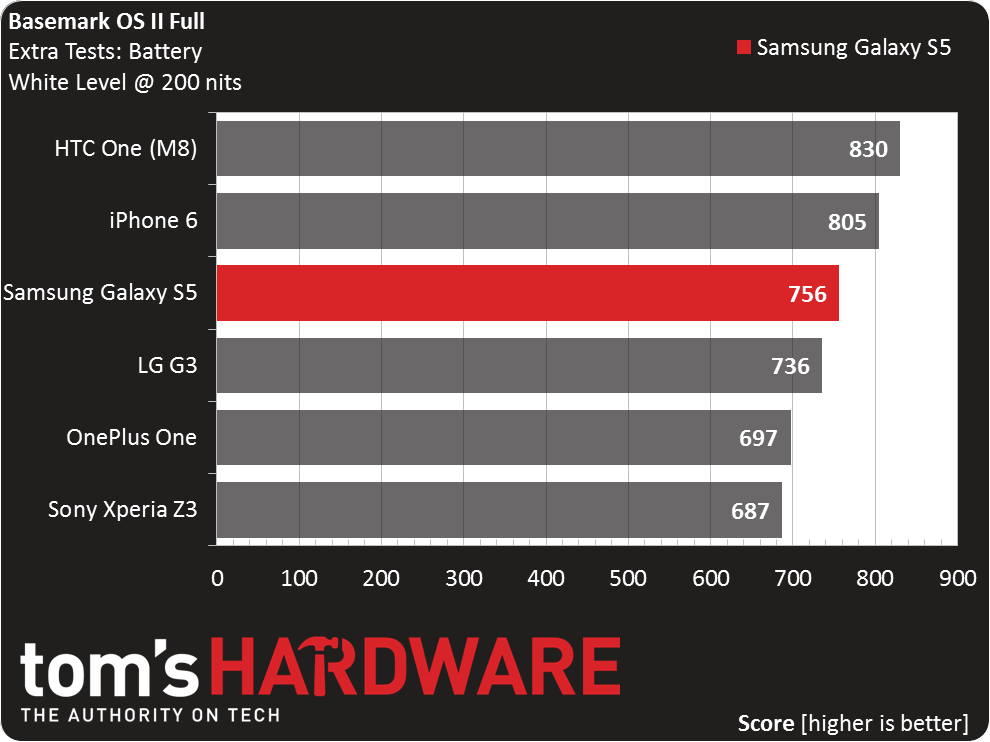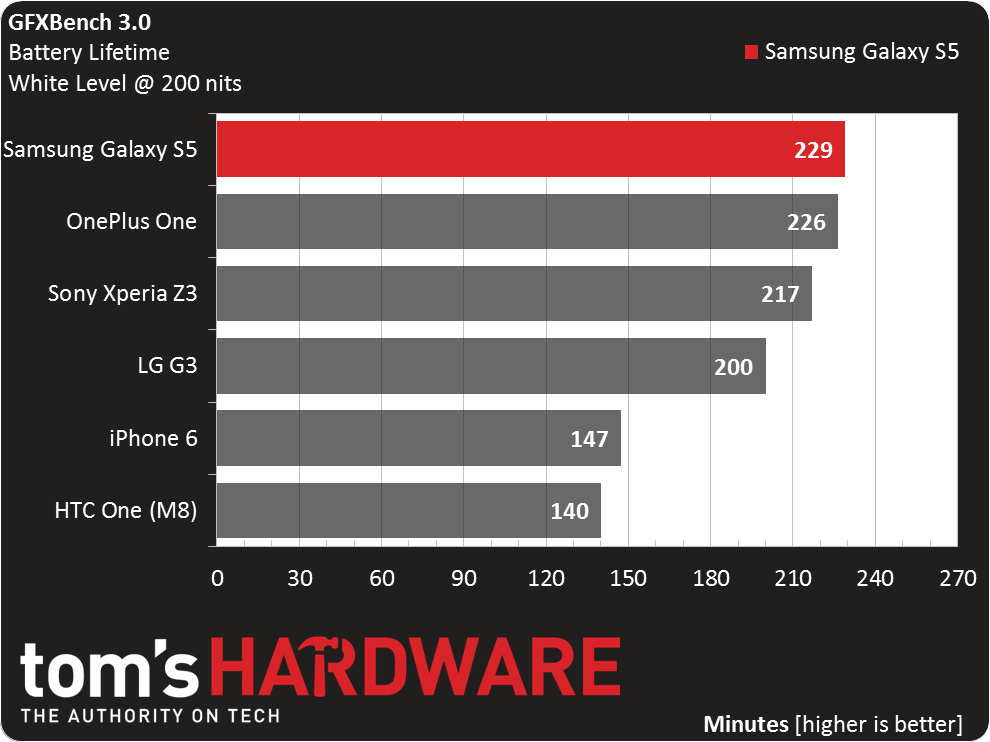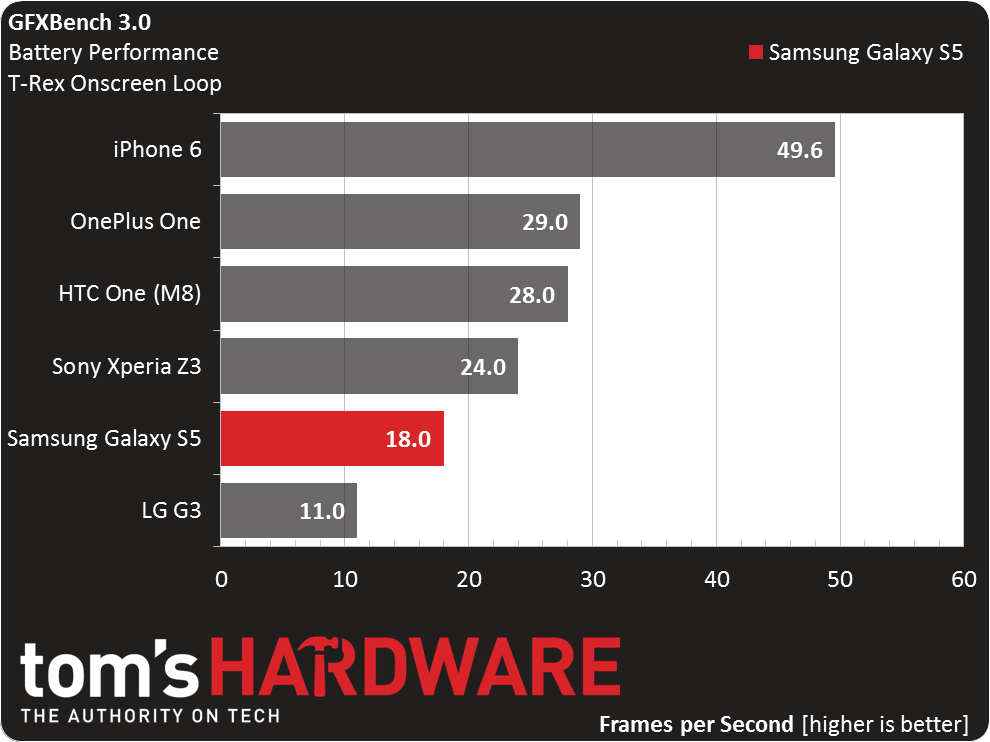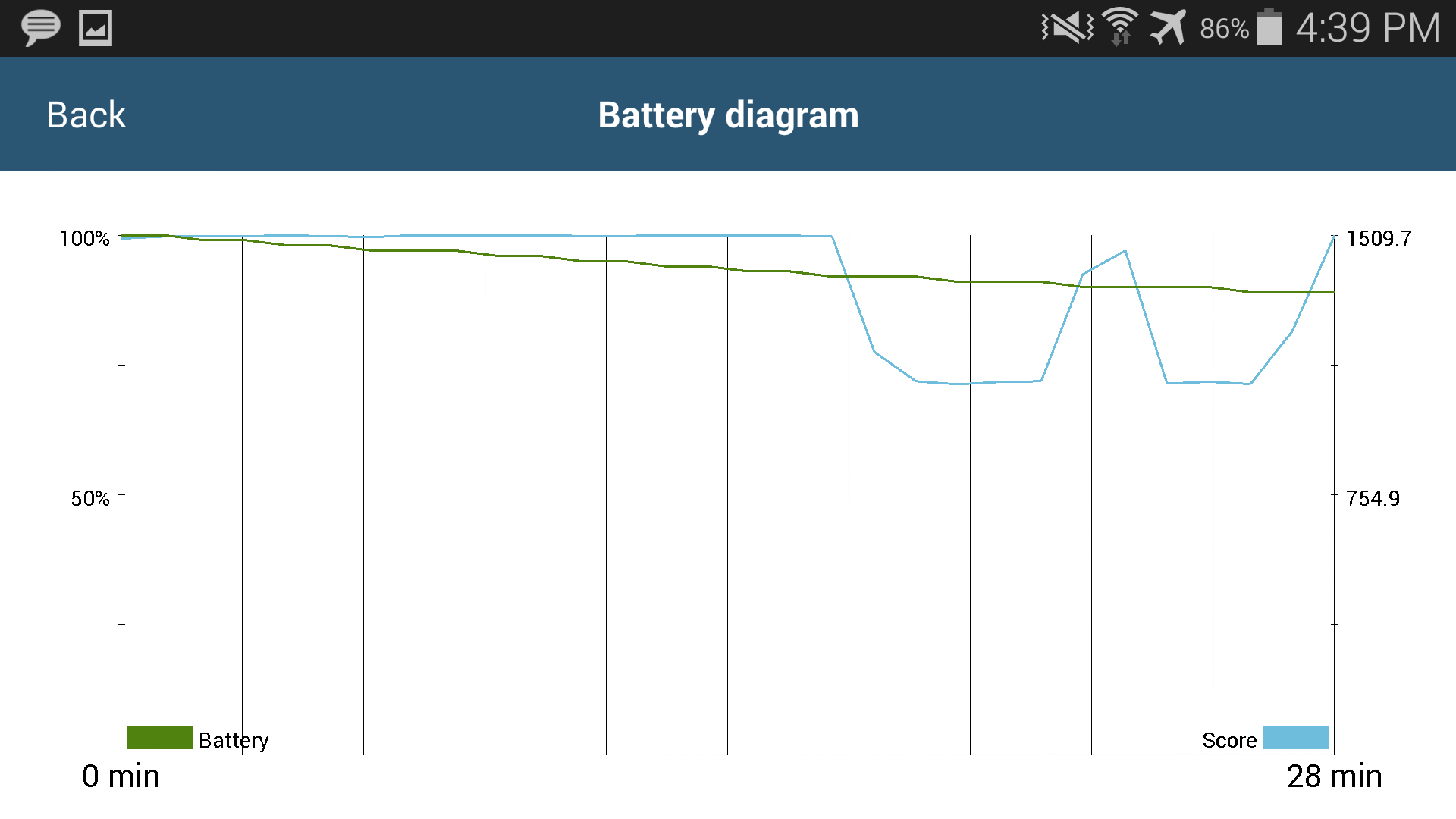Samsung Galaxy S5 Smartphone Review
Will the gravity well from Galaxy S5 capture your interest, or will you streak past with escape velocity?
Why you can trust Tom's Hardware
Results: Battery And Throttling
Basemark OS II Full (Anti-Detection)
The Basemark OS II battery test scores are derived by repeatedly running the devices until enough data has been collected to determine the drain rate of the device.
In our first battery benchmark, the Galaxy S5 turns in an average performance, sitting between the One (M8) and Xperia Z3, both of which have similar size screens and the same HD resolution. Despite having about an 8%-larger battery than the HTC, Samsung's S5 scores 10% lower. However, it performs better than the 11%-larger battery in the Xperia Z3 by about the same amount. The iPhone 6 has a substantially smaller battery than the S5 (1800mAh versus 2800mAh), but manages to perform slightly better, its smaller screen, efficient SoC and software optimizations helping to reduce power drain.
GFXBench 3.0 Corporate
GFXBench's battery test measures battery life and performance stability by logging frame and battery discharge rate as the on-screen T-Rex test runs for 30 consecutive iterations. The results are given in two scores: estimated battery life in minutes and the number of frames rendered on the slowest test run (to gauge if a device is throttling).
This test stresses the GPU and serves as an indicator for battery life when playing games. With its chart-topping performance, one might conclude that the S5 is a clear winner. However, this chart doesn't tell the whole story. We also need to look at the average frames per second during each run to see how much work the phones are actually doing. Noting that the two all-metal phones have the worst battery life here foretells what we'll see in the next chart.
Average performance for the S5 over thirty iterations of T-Rex drops to 18 FPS compared to 27 FPS for a single iteration, indicating thermal throttling. The three metal phones—iPhone 6, One (M8) and OnePlus One (internal magnesium chassis)—are able to dissipate heat more effectively, which means they continue to operate at peak frequency and consume more power.
The diagram below shows how the S5’s performance varies over time.
While not as severe as the thermal throttling we saw with the LG G3, the S5 still can't keep its GPU running at 100% for long before it has to throttle clock rate.
Get Tom's Hardware's best news and in-depth reviews, straight to your inbox.
Battery life for the Galaxy S5 is merely average. Unfortunately, the upcoming update to Android 5.0 will likely reduce battery life further, since AMOLED screens are most efficient with dark interfaces (effectively no power draw when displaying black) and Lollipop uses all-white backgrounds.
Current page: Results: Battery And Throttling
Prev Page Results: Display Measurements Next Page Did A New Star Form In Galaxy S5?-
grumpigeek My Galaxy S5 in in an Urban Armor Gear case that looks great and protects the phone, so I don't really care what it looks like.Reply
The device is 100% reliable and I have found the battery life to be excellent - way better than any smartphone I have had previously.
-
implantedcaries Guys you are reviewing a mobile which was released a year and then calling it average compared to competitiReply -
firefoxx04 I have an s5. This review would have been welcomed a year ago.Reply
The phone is top notch. I've known this for a while. -
implantedcaries Guys you are reviewing a mobile which was released a year back and then calling it average compared to competition?? Seriously? Yes I agree S5 is not the most exciting prospect out there for new mobile buyers now, but it wasn't so in 2014 when it was actually launched. Also its one of the very few mobiles already receiving lollipop updates.. No mention of that.. Any hidden agenda against Samsung?Reply -
FritzEiv Folks, you're right. This review is quite late. We began testing the S5 a long time ago, but we've had a bit of a backlog of smartphones to review since Matt (our senior mobile editor) started on staff and we're just catching up. We aren't trying to pretend it's a new phone, thus we haven't put it up in our main feature carousel; but we did want to publish this and others just to have them for archival and future referral and comparison purposes. We are working on other smartphones that are little more current and then we hope to be "on time" as new ones arrive. Hence, for example, Matt's performance preview of Qualcomm's Snapdragon 810 earlier this week. We've been a bit more timely on devices like the OnePlus and the iPhone reviews as well. But hey, continue your sarcasm, because we probably deserve it. Just want you to know why we are doing this, that we're not trying to fool anyone, and that we'll be caught up in short order. Thanks for your patience.Reply
- Fritz (Editor-in-chief) -
Mac266 One thing in this review irritated me: the whole "it's ugly" thing. It might not suit you, but lots of people like the way it looks. Aesthetics are purely subjective, and should definitely not be judged a con on one mans opinion.Reply -
peterf28 Iam not buying a smartphone again where the chipset drivers are not open source. Like what samsung did with the S3, it is stuck on Android 4.3, and there is nothing you can do. All the custom roms are unstable crap because there are no up to date drivers For current kernels. It is like buying a PC without the possibility to update the OS . Would you buy that ?Reply -
jdrch FYI phone speakers are placed on the back of phones to take advantage of acoustics when the phone is laying on a surface. The surface spreads and reflects the sounds back to the user much better than the speaker itself would. Try it yourself.Reply



